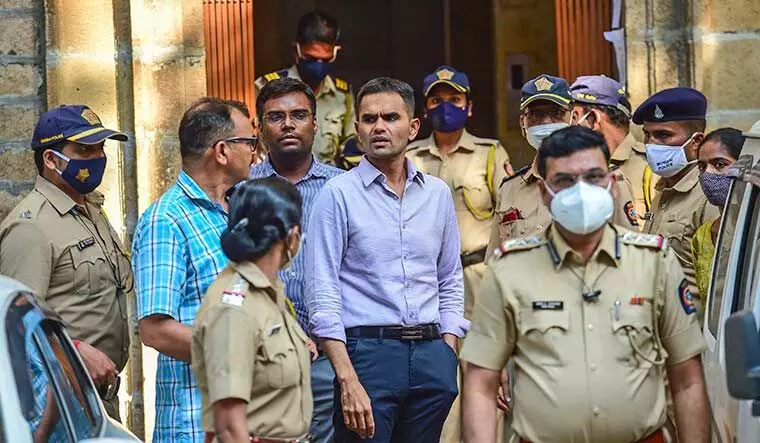Revision required

Based on the findings of an NCB-initiated Special Enquiry Team (SET), the Central Bureau of Investigation (CBI) registered an FIR against Sameer Wankhede. The charges against him are framed under Section 120-B of the IPC (criminal conspiracy); Section 388 of the IPC (threat of extortion); and Prevention of Corruption Act (for bribery). The NCB had set up the SET after Prabhakar Sail, one of the accomplices of Sameer Wankhede, alleged that the latter conspired to extort money from Aryan Khan’s family. The case against Sameer Wankhede holds immense weight, as it entails corruption at a very high level. Wankhede is a 2018-batch IRS officer and has served for over a decade at crucial positions. Earlier, Sameer Wankhede had grabbed the limelight in the Rhea Chakraborty case following the death of Sushant Singh Rajput. Despite massive media glare and national focus extending over months, very little substance was found in the case. Unfortunately, the emerging Bollywood actress had to undergo immense public scrutiny and even incarceration which can be said to be highly disproportionate to the eventual findings. Wankhede’s romance with Bollywood stars dates further back when he was deployed in the Customs Department. Certain seizures from and confrontation with celebrities had earned him a fair number of headlines. In the wake of his past endeavours, the recent FIR by the CBI has raised suspicion about his approach in general. Be it Aryan Khan or Rhea Chakraborty, both had to go through a prolonged period of incarceration and trauma. They appear to have been made easy targets amid a broader narrative of the Bollywood sinking deep under the influence of narcotism. In want of substantive evidence, the narrative can safely be said to be a fabricated one. It may be noted that the amount of narcotic products recovered from the raided Cordelia ship was too meagre to be termed as a drug haul. Merely 13 grams of cocaine, 21 grams of marijuana, and 22 pills of MDMA were reportedly recovered. In its FIR, the CBI has covertly indicated inconsistencies in the raid and investigation carried out by Wankhede. In the first place, the list of suspects after primary investigation underwent several revisions. Secondly, the role of the two witnesses, Kiran Gosavi and Prabhakar Sail, who were strangely given the task of being witnesses, has come under questioning. Whether the charges of corruption, extortion and criminal conspiracy against Sameer Wankhede turn out to be true or false is a big question, indeed. But no less important is the consideration that Aryan Khan and his family had been subjected to immense trauma. It is clear that the law was misused/abused. A 25-year-old youngster was detained for around a month on feeble grounds. If found involved in the alleged charges, Sameer Wankhede must face strict action. However, it will be wrong to put the entire blame on Wankhede. The Aryan Khan case has highlighted the urge for two sets of reforms. First, there is a need to rethink the manner in which certain drugs are treated in India. There might be a need to dilute the stringency towards the use of drugs in non-harmful amounts. Secondly, there has to be reforms in the laws governing substance abuse. The Narcotic Drugs and Psychotropic Substances Act, 1985, which is often equated with the ‘draconian’ UAPA in terms of stringency, requires a revision. It is one of the rare laws that presumes the alleged person to be ‘guilty until proven innocent’ and places the onus of proving the same on him/her. The core question is whether the possession and consumption of certain drugs in limited doses for recreational purposes should amount to such a grave offence. Rationalisation of NDPS and related laws can not only strip authorities of disproportionate powers to harass individuals, with malice or otherwise, but also curb the illegal smuggling of such substances. A distinction between serious and recreational abuse/use of substances can make it easier for authorities to go after the real targets. Coming back to the present case, the credibility of Sameer Wankhede is at stake, not without reasons!



